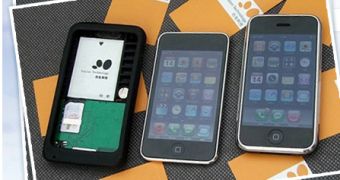GoSolarUSA has announced that the revolutionary Peel 520 could soon be a licensed Apple accessory. The company’s president and CEO, Tyson Rohde, said that Apple reps contacted GSLO, but failed to specify the actual topics of discussion.
Rhode claims that, following these discussions, his company filed an application with the Mac maker to participate in the MiFi program, in an effort to get “Made for iPod” certification from Apple.
“After being contacted by representatives of Apple, Inc. GSLO filed an application with Apple this week to participate in the MFi Program,” reads the company’s recently issued press release.
GSLO goes to explain for those who aren’t familiar with Apple’s MiFi program that “developers who participate in this licensing program receive technical specifications and hardware components from Apple and are eligible to emblazon products with MFi certification logos: ‘Made for iPod’, “Made for iPad’, and ‘Made for iPhone’.”
According to GSLO, “These logos signify that electronic accessories were designed to connect specifically to Apple products and have been certified by the developer to meet Apple standards.”
“We intend to participate in the MFi licensing program in order to mitigate any future risk that our intellectual property overlaps with Apple’s,” Rohde said.
“We are excited to work alongside Apple to bring the Peel 520 and other products to market in a manner that is consistent with Apple’s highest standards.”
A widely covered subject here on Softpedia, the Peel 520 is a fledging iPod touch accessory that slips over the Apple portable player to turn it into a smartphone.
The solution requires a jailbreak, which begs the question: does GSLO honestly believe Apple will give the Peel 520 “Made for iPod” certification, when the Cupertino giant downright forbids the practice?
GSLO also announced that iPod Touch users can sign up now to be among the first to purchase the Peel 520 when the device becomes available in the U.S.
To be noted that the product does not necessarily need Apple’s approval to go on sale.

 14 DAY TRIAL //
14 DAY TRIAL //